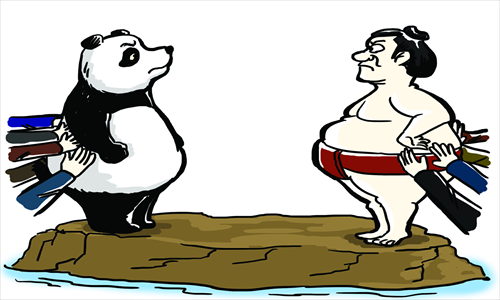Shelving Diaoyu Islands dispute again would be grievous mistake

A cyclical deterioration has been seen in the past 40 years since Sino-Japanese diplomatic relations were normalized. This is due to the issues about the understanding of history and the Diaoyu Islands dispute. The former indicates Japan's contempt toward its former victim countries, and the latter exacerbates Japan's hostility toward China by taking advantage of the US-Japan alliance.
Japan has even threatened to use the Self-Defense Forces in the current Diaoyu Islands crisis. But will a Sino-Japanese war really break out?
China has always advocated shelving the dispute with Japan over the Diaoyu Islands. The two countries agreed to "settle all disputes by peaceful means." In other words, the Sino-Japanese Treaty of Peace and Friendship will be violated by any threat of force in the handling of the Diaoyu Islands issue. Those threats must be solved through diplomatic negotiations.
On the one hand, Japan attaches great importance to maintaining economic relations with China and enjoying the enormous benefits offered up by this huge market. On the other hand, it is pushing the Diaoyu Islands dispute from controlling them to occupying them. If Japan wants to achieve a political and economical victory, it should avoid a war over the Diaoyu Islands with China at all costs.
Therefore, Japan has backed Southeast Asian countries in territorial disputes with China. To prepare for the international political environment, Japan managed to extend the Japan-US Security Treaty to the Diaoyu Islands through the fishing boat collision incident in 2010.
As for preparation in its domestic environment, the Japanese aim to seek a separate development of the Diaoyu Islands. The Tokyo metropolitan government launched an island purchase plan to break the status quo when no development of the islands was carried out by either country. Furthermore, Japan initiated advertising on funding for the island purchase in a bid to mobilize patriotism.
The Japanese government raised the "nationalization" of the islands after Chinese fury was spurred on by the island purchase plan. The initiative aims to urge the Chinese government to accept the trading of the Diaoyu Islands led by the Japanese government.
In fact, since the Diaoyu Islands crisis has repeatedly flared up, China should face up to the reality that a friendly way of shelving disputes no longer exists.
Nevertheless, it is distracting for China's foreign policy to constantly dismiss conflicts with Japan as petty actions by a small number of right-wingers. This traditional ideology is divorced from reality and does not allow decision-makers to set a foreign policy based on serious political responsibility between nations.
Furthermore, it only allows problems to worsen without a convenient method to solve them.
To reverse the state of affairs, China should return to the diplomacy drawing board with Japan, face up to the adverse consequences following the repeated shelving of disputes and immediately act to negotiate and solve the Diaoyu Islands issue.
Former Japanese prime minister Kakuei Tanaka and former Chinese premier Zhou Enlai reached an agreement on shelving disputes for the moment during Sino-Japanese diplomatic normalization talks.
But files of September 1988 released in Japan recently falsely claimed premier Zhou called the islands by their Japanese name, Senkaku. This phenomenon is rather bizarre.
Based on this apparently absurd argument, Japanese scholars concluded that there was no territorial issue. However, without recognizing the Diaoyu Islands issue, Sino-Japanese diplomatic relations could not exist at all. It is the foundation of the current Sino-Japanese negotiations.
Subjectivity must be strengthened in Chinese diplomacy toward Japan. Populist actions will not solve the problem of international politics.
Stronger reactions among the Chinese people will be taken advantage of by Japan to further strengthen its power.
Once out of control, a huge wound will appear to prevent reconciliation between the two countries. This will be doomed to be a failure for their diplomacy regardless of who wins or loses. Therefore, it is time to stop fantasizing over shelving disputes, begin negotiations and provide a clear conclusion under international law.
The author is associate professor at the International Communication Studies Center, Communication University of China. opinion@globaltimes.com.cn